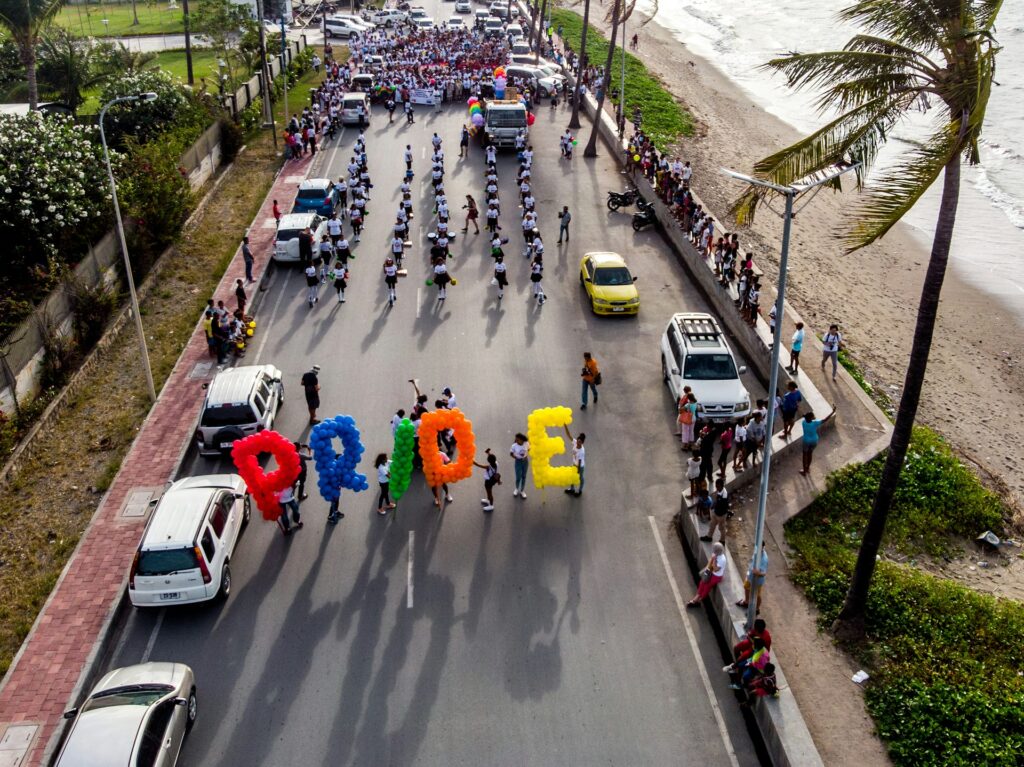Introduction
In the journey of love, relationships encounter challenges and triumphs alike. For LGBTQIA+ couples in Denver, finding a couples counselor who understands and respects their unique dynamics is crucial for fostering growth and understanding within their partnerships. Explore Denver’s top LGBTQIA+ couples counselors for expert support, inclusivity, and commitment.
Strengthen your relationship with the right counselor.
Isaac Archuleta – Meet Isaac, the visionary behind iAmClinic with a Master of Arts in Clinical Mental Health Counseling, over 14 years of experience, and with certifications in EMDR, Somatic Breathwork, Neurofeedback training, and Ketamine/Cannabis-assisted Therapy, Isaac integrates diverse therapeutic modalities to guide clients towards liberation and internal peace. Learn About Isaac’s Story Here!
Certifications & Credentials






Hanna M Carrell – Meet Hanna M. Carrell, your compassionate guide to healing and growth, with a focus on supporting the LGBTQ+ community. With a deep understanding of the unique challenges faced by LGBTQ+ individuals, Hanna provides affirming and inclusive therapy tailored to your specific needs.
Jesse Andrew Proia – Meet Jess, your dedicated LGBTQ+ specialist therapist based in Denver, offering in-person and virtual sessions across CO, CA, and VT. With nearly a decade of experience serving the LGBTQ+ community, Jess brings a deep understanding of the unique mental health needs of queer individuals.
Kara Johnson Martone – Meet Kara, an experienced therapist specializing in LGBTQIA+ affirming care, offering supportive guidance to those seeking clarity and stability within the community. With expertise in trauma-informed care and a social justice mindset, I help LGBTQIA+ individuals harness their strengths and navigate their journey with resilience.
Matt Meurer-Lynn – Meet Matt, an LGBTQ+ Affirming therapist specializing in guiding LGBTQ+ individuals through unique journeys. Uncovering patterns and motivations while exploring how relationships shape trust and connection.
How Do You Choose the Right LGBTQIA+ Couples Counselor?
Choosing the correct LGBTQIA+ couples counselor is crucial, as it deeply influences your relationship’s health and longevity. However, navigating this process can be overwhelming due to numerous considerations. This guide explores key criteria for selecting LGBTQIA+ couples counselors, empowering you to make informed decisions for your relationship’s well-being.
Are they credentialed therapists?
When embarking on the journey of finding a couples counselor, one of the first questions to ask is whether they are credentialed. A credential typically signifies that the therapist has undergone specific training, education, and licensing to practice therapy professionally. While it might seem like a minor detail, the distinction between a credentialed therapist and someone without proper credentials can have significant implications for the quality and effectiveness of the counseling provided. Learn more about our team!
Why it matters:
- Expertise and Training: Credentialed therapists have typically completed rigorous academic programs, internships, and licensure exams. They possess a solid foundation in psychological theories, counseling techniques, and ethical standards. This background equips them with the knowledge and skills necessary to address a wide range of challenges that may arise in couples counseling, including those unique to LGBTQIA+ relationships. Because a highly trained therapist is more efficient and thorough, you will spend less time and money on therapy.
- Understanding of LGBTQIA+ Challenges: Credentialed therapists who lead minority-focused practices understand the importance of creating a safe and inclusive space for clients from marginalized communities, including the LGBTQIA+ community. Choosing a therapist who values diversity and inclusion demonstrates a commitment to receiving counseling services in an environment where your identities are not only acknowledged but celebrated. It fosters a sense of trust and rapport between clients and therapists, laying the groundwork for meaningful therapeutic work that addresses the unique needs and challenges faced by LGBTQIA+ couples. Although some therapists are LGBTQIA+-friendly, we suggest finding a therapist who is part of the LGBTQIA+ community. Doing so will protect you from having to teach your therapist about some of the nuances that come with being gay, lesbian, queer or trans. It will also give you the space to talk freely without having to justify your predicament.
- Cumulative Experience: Experience matters in therapy, especially when dealing with complex issues such as those encountered in LGBTQIA+ couples counseling. Credentialed therapists with extensive experience bring a depth of knowledge, insight, and skill honed over years of practice. By choosing a therapist with a significant amount of experience and ongoing training, LGBTQIA+ couples can feel confident that they are receiving guidance and support rooted in expertise and competence.
- Access to Resources and Referrals: Therapists who are active advocates for the LGBTQIA+ community are likely to be well-versed in the social, political, and cultural issues that impact LGBTQIA+ individuals and relationships. They can provide valuable resources, referrals, and support networks to help couples navigate external challenges and access affirming services. Choosing a credentialed therapist who proudly identifies as part of the LGBTQIA+ community sends a powerful message of solidarity and support. It reinforces the notion that LGBTQIA+ couples deserve competent, affirming care from professionals who share and understand their identities.

Are they actually part of the LGBTQIA+ Community or are they pandering?
When selecting an LGBTQIA+ couples counselor, it’s essential to discern whether the therapist genuinely identifies as part of the LGBTQIA+ community or if they are merely pandering. Here’s why this distinction matters:
Why it matters:
- Authentic Understanding and Empathy: Therapists who are authentically part of the LGBTQIA+ community bring a deep understanding and empathy for the challenges, triumphs, and nuances of LGBTQIA+ relationships. Their lived experiences allow them to connect with clients on a profound level, fostering trust and rapport in the therapeutic relationship. In contrast, counselors who are pandering may lack genuine insight into the intricacies of LGBTQIA+ experiences. Their attempts to cater to LGBTQIA+ clients may come across as superficial or tokenistic, ultimately hindering the therapeutic process.
- Cultural Competency and Affirming Practices: Authentic LGBTQIA+ couples counselors typically undergo specialized training and education to develop cultural competency and affirming therapeutic practices. They are familiar with LGBTQIA+ terminology, identities, and community resources, ensuring that their counseling approach is inclusive and respectful. Counselors who are pandering may lack the cultural competency necessary to provide effective support to LGBTQIA+ couples. Their ignorance or insensitivity towards LGBTQIA+ issues may result in microaggressions, misgendering, or other harmful behaviors that can undermine the therapeutic environment.
- Role Modeling and Representation: LGBTQIA+ couples often seek role models and representation in their therapists, especially when facing societal stigma or discrimination, as well as relational healthy and mature skills that stabilize relationships. Authentic LGBTQIA+ counselors serve as positive role models, demonstrating resilience, self-acceptance, and pride in their identities and relationships. In contrast, counselors who are pandering may contribute to feelings of tokenism or exploitation within the LGBTQIA+ community. Their insincerity undermines the trust and credibility necessary for effective therapeutic work, potentially leading to feelings of disillusionment or mistrust in the counseling process. Start your healing journey now!
Are They Trained in LGBTQIA+ Affirmative Therapy?
LGBTQIA+ affirmative therapy acknowledges and validates the diverse identities and experiences within the LGBTQIA+ community. When choosing a couples counselor, prioritize professionals who have received specific training in LGBTQIA+ affirmative therapy. Look for counselors who demonstrate a deep understanding of LGBTQIA+ issues and create inclusive and affirming therapy spaces for all clients.
Do You Feel Comfortable and Supportive?
Trust your instincts and prioritize your comfort level when selecting a couples counselor. Schedule initial consultations with potential counselors to gauge your compatibility and assess whether you feel comfortable opening up and sharing your concerns. Choose a counselor with whom you feel a strong rapport and connection, as this will facilitate a more productive and effective therapeutic process.”

Navigating Challenges in LGBTQIA+ Relationships
While love and connection are universal, LGBTQIA+ couples face unique challenges. This post explores these challenges and provides strategies for building resilience and navigating them as a unified team.
Addressing Internalized Stigma and Shame:
Many LGBTQIA+ individuals may internalize societal stigma and shame related to their sexual orientation, gender identity, or expression. These feelings can affect self-esteem, communication, and relationship dynamics. Couples can tackle internalized stigma by promoting self-acceptance, practicing self-compassion, and engaging in open, empathetic, and honest conversations about their experiences and how they affect the relationship.
Navigating Family Dynamics and Acceptance:
Family dynamics and acceptance can be significant sources of stress and conflict for LGBTQIA+ couples. Some individuals may face rejection or a lack of understanding from family members, while others may navigate complex dynamics related to coming out or family expectations. Couples can support each other by establishing boundaries, advocating for each other’s needs, and seeking support from chosen family and LGBTQIA+ communities.
Communication and Conflict Resolution:
Effective communication and conflict resolution are crucial skills for any relationship, but they can be especially challenging for LGBTQIA+ couples dealing with issues related to anger and/or resentment, discrimination, or societal pressures- all of which add up over time. Couples can enhance their communication by practicing active listening, openly expressing emotions and needs, and seeking support from couples counselors or therapists trained in LGBTQIA+ affirmative therapy.
Dealing with Discrimination and Microaggressions:
LGBTQIA+ individuals may encounter discrimination, microaggressions, and systemic inequalities in areas such as employment, healthcare, and public spaces. These experiences can negatively impact mental health and strain relationships. Couples can support each other by validating each other’s experiences, advocating for LGBTQIA+ rights and visibility, and seeking out affirming and inclusive spaces where they feel safe and respected.
Navigating Legal and Relationship Recognition:
Legal recognition of LGBTQIA+ relationships varies across countries and regions, presenting challenges related to marriage rights, adoption, healthcare decision-making, and parental rights. Couples can address these challenges by educating themselves about their legal rights and options, seeking advice and support from LGBTQIA+-friendly attorneys, and advocating for policy changes and LGBTQIA+ rights.

The Importance of Inclusivity and Cultural Competency
In the world of counseling, inclusivity, respect, and cultural competency are not just desirable qualities but essential pillars of effective therapy, especially for LGBTQIA+ couples. Here’s why counselors who embody these traits are crucial:
1. Validation and Trust:
Inclusive counselors validate and understand the identities of LGBTQIA+ couples, fostering trust and creating safe spaces where they can explore their relationships authentically.
2. Understanding Intersectionality:
By recognizing the diverse backgrounds and experiences within LGBTQIA+ couples, inclusive counselors navigate complexities and appreciate each partner’s unique background and perspective.
3. Effective Communication:
Cultural competency enables counselors to break down communication barriers, ensuring that LGBTQIA+ couples can express themselves openly and engage in constructive dialogue about their relationships.
4. Addressing Systemic Challenges:
Inclusive counselors understand and advocate for LGBTQIA+ couples facing societal stigma, legal hurdles, and discrimination, providing support and guidance through external stressors.
5. Creating Affirming Environments:
Through inclusive language and LGBTQIA+ affirmative therapy techniques, counselors cultivate environments where LGBTQIA+ couples feel validated, empowered, and supported in their journey together. We always say that it is our job to work ourselves out of a job.
Counselors who prioritize inclusivity, respect, and cultural competency are crucial in supporting the well-being and success of diverse LGBTQIA+ couples. Their dedication to understanding, acceptance, and advocacy significantly enhances the strength and resilience of LGBTQIA+ relationships everywhere.
Frequently Asked Questions
Choosing the correct LGBTQIA+ couples counselor is crucial for your relationship’s well-being. Consider factors such as their credentials, training in LGBTQIA+ affirmative therapy, cultural competency, experience, access to community, and your comfort level during initial consultations.
LGBTQIA+ affirmative therapy acknowledges and validates the diverse identities and experiences within the LGBTQIA+ community. Counselors who specialize in this approach create inclusive and affirming therapy spaces, understanding the unique challenges faced by LGBTQIA+ individuals and couples.
Yes, LGBTQIA+ couples may encounter unique challenges related to internalized stigma and shame, navigating family dynamics and acceptance, communication and conflict resolution, dealing with discrimination and microaggressions, legal and relationship recognition, among others. And because these challenges add up over time, counseling can help address these challenges and foster resilience within the relationship.
Inclusivity and cultural competency are essential in LGBTQIA+ couples counseling, particularly when practices are led by minorities and focused on inclusion. These principles create safe, affirming environments where LGBTQIA+ couples feel understood, respected, and empowered to navigate their relationships authentically. By prioritizing representation, cultural understanding, and effective communication, counselors can ensure that LGBTQIA+ clients receive support that is tailored to their unique needs and experiences.
LGBTQIA+ couples can navigate challenges by promoting self-acceptance, practicing effective communication and conflict resolution, seeking support from affirming communities, educating themselves about legal rights, and advocating for LGBTQIA+ rights and visibility. Counseling provides a supportive space to address these challenges and strengthen the relationship.
Ready to Strengthen Your Relationship?
Take the first step towards fostering growth and understanding within your LGBTQIA+ partnership. Choose one of Denver’s top LGBTQIA+ couples counselors for expert support, inclusivity, and commitment. Strengthen your bond and navigate challenges with confidence. Book your session today and embark on a journey towards a brighter, more fulfilling relationship. Your love deserves the best care.


